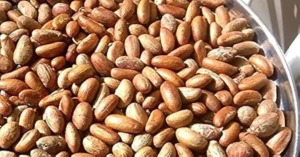Table of Contents
Discover the Benefits and Uses of Kola Nut in Health
The kola nut, though less known, is a significant ingredient in many beverages and herbal supplements. This nut not only provides a high amount of caffeine but also contains a wealth of antioxidants, offering numerous potential health benefits.
What is Kola Nut?
The kola nut, also known as the cola nut, is an edible seed from the kola tree, native to West Africa. This tree can grow up to 60 feet tall with yellow flowers and star-shaped fruits. Each fruit contains between two and five kola nuts. Kola nuts are widely used in supplements and as a natural flavor enhancer.
In terms of flavor, kola nut initially has a bitter taste but becomes sweeter as it is chewed. Once dried, the kola nut has a milder aroma, similar to nutmeg.
Note that kola nut should not be confused with other plants like gotu kola or bitter kola, as they are entirely different species despite having similar names.

Kola Nut: Benefits and Uses in Health
Types of Kola Nut
The kola nut is popular in West Africa, where it is often consumed fresh or dried to boost energy. The two main varieties are red kola and white kola, commonly found together in a single fruit.
Cultural Role of Kola Nut
In many cultures, kola nut is used in ceremonies and traditions. For instance, in the Igbo kola ceremony, the nut is presented as a gesture of hospitality and symbolizes peace and goodwill.
Health Benefits of Kola Nut
1. Energy Boost
Kola nuts contain high amounts of caffeine, a central nervous system stimulant that enhances energy levels and focus. Caffeine works by altering neurotransmitter activity in the brain, helping you feel more alert.
Studies show that moderate caffeine intake can improve endurance, brain function, and mood while reducing fatigue.
2. Supports Weight Loss
Due to its high caffeine content, kola nut may aid weight loss by boosting metabolism, helping to burn more calories throughout the day. Additionally, it may help reduce calorie intake, which is beneficial for weight loss.
3. Relieves Headaches
Caffeine has long been used as a natural remedy for headaches and migraines. It helps by constricting blood vessels in the brain, reducing blood flow, and relieving pain.
Historically, kola nuts were also used to alleviate symptoms like nausea and indigestion, though more research is needed to confirm these effects.
4. Stabilizes Blood Sugar
Recent studies have shown a link between kola nut and blood sugar control, particularly in managing diabetes. In animal studies, kola nut extract was found to lower blood sugar levels and improve pancreatic beta-cell function.
Other studies also indicate a link between caffeine and the ability to balance blood sugar, potentially lowering the risk of type 2 diabetes.
5. Prevents Bacterial Growth
Some studies suggest that kola nut may have potent antibacterial properties, helping to inhibit the growth of harmful bacteria. A study in Nigeria found that red and white kola extracts effectively combated bacteria such as Streptococcus anginosus and Proteus vulgans.
How to Use Kola Nut
In many parts of the world, kola nuts are available as extracts or powders to make it easier to incorporate into the diet. You can add kola nut powder to yogurt, smoothies, or cereals for an extra caffeine and antioxidant boost. Additionally, you can make kola nut tea by adding a teaspoon of powder to a cup of hot water and letting it steep for a few minutes.
Nutritional Value of Kola Nut
Kola nuts are rich in caffeine and theobromine, a chemical compound also found in chocolate and tea leaves, which has vasodilating and heart-stimulating effects.
Kola nuts also contain antioxidants and polyphenols, including catechin, epicatechin, apigenin, and naringenin.
Risks and Side Effects
According to the U.S. Food and Drug Administration, kola nuts are generally recognized as safe for consumption. However, due to their high caffeine content, excessive consumption may cause side effects like hyperactivity, anxiety, and difficulty sleeping.
Caffeine intake should be limited to less than 400 milligrams per day for adults and 200 milligrams for pregnant women. Caffeine is not recommended for children or teenagers due to limited safety research.
Conclusion
Kola nut is a popular seed originating from West Africa that not only serves as an ingredient in beverages but also holds promising health benefits. However, due to its high caffeine content, it should be consumed in moderation to avoid side effects.